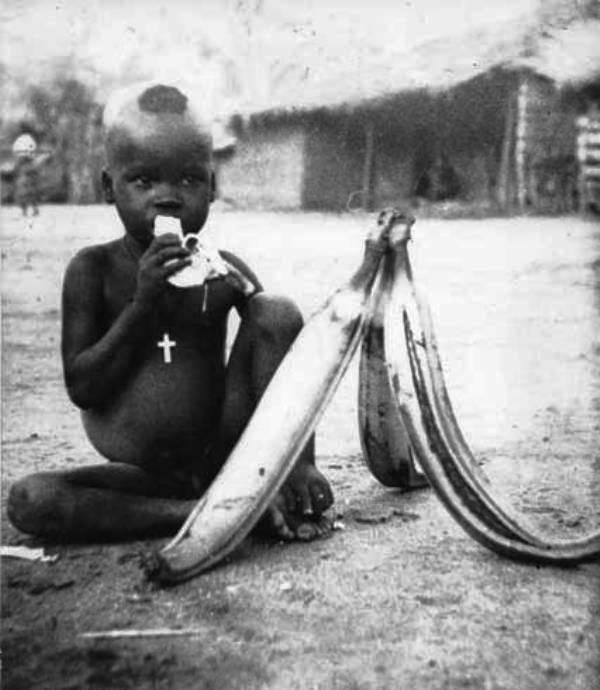
Central African Republic: History

Figure 1.--This photograph was taken in the Central African Republic during the 1980s, after the tragic era of Emperor Bokassa's self-poclaimed Empire. We see a child eating a banana. In front of him we can see three big plantains which are cooked to be eaten. As we can see the child comes from a Christian family. Probably in earlier times the missionaries would have required some sort of clothing, albeit minimal. At this time the general attitude already had changed.
|
|
The principal tribes in what is now the Central African countries were the Azande, Banda, Baya, and Ngbandi. These and other smaller tribes were terrorized by slave traders. Located in central Africa, the Europeans colonized the area later than along the coast. The French finally moved inland into the area (1894). The French called it Ubangi-Shari. French authorities made several reorganizatins of its African colonies. They joined Ubangi-Shari with Chad (1905). Then they joined it with Gabon and the Middle Congo to form French Equatorial Africa (1910). After World War II a rebellion occurred (1946). Weakened by the War, France decided not to expend the resources needed to retain control of such a remote area and granted self-government. The population voted to become an autonomous republic within the French Community (1958). President David Dacko proclaimed the independence from France (1960). Many Africans leaders at the time saw socialism and communism as the panacea for rapid development. Dacko decided to move the country toward Communist China. Col. Jean-Bédel Bokassa, army chief of staff. staged a coup (1965). Bokassa converted the country into the Central African Empire (1976). Bokassa had himself declared emperor--Emperor Bokassa I. His reign was marked by excesses, both brutality and extrodinary fiscal expenditures. He ran up huge debts. Bokassa after bankruping the country was finally deposed by another coup (1979). Former president David Dacko became president again and the country was once again the Central African Republic. The Army staged a coup and overthrew President Dacko a second time (1981). After several decadeds of dictatorial or miitary rule, President André Kolingba, not altogether willingly, announced that the CAR would move toward parliamentary democracy (1991). Prime Minister Ange-Félix Patassé defeated Kolingba in the ensuing election (1993). Patassé promissed to pay the back salaries of the military and civil servants. The coutry's huge debts encurred by Bokassa, however, made it impossible for President Patassé to pay the back salaries as promised. The military mutined. Patassé requested French intervention and French troops suppressed the mutiny. The United Nations sent an all-African peacekeeping force to the CAR (1998). Patassé defeated Kolingba in elections (1999). There were widespread charges of voter fraud. Patassé managed to survive a coup attempt (2001). Gen. François Bozizé organized a coup (2003). Bozizé was elected president in what was generally see as fair and free elections (2003). The International Criminal Court began investigating charges of attrocities that were allegedly committed during the 2002-03 civil unrest following the attempted coup against Patassé (2007). Prime Minister Elie Dote resigned one day before Parliament was preparing to debate a censure motion (2008). Parliament chose Faustin Archange Touadéra as his successor (2008).
HBC

Navigate the Boys' Historical Clothing Web Site:
[Introduction]
[Activities]
[Biographies]
[Chronology]
[Cloth and textiles]
[Clothing styles]
[Countries]
[Topics]
[Bibliographies]
[Contributions]
[FAQs]
[Glossaries]
[Images]
[Links]
[Registration]
[Tools]
[Boys' Clothing Home]
Navigate the Boys' Historical Clothing national pages:
[Return to the Main Central African Republic page]
[Return to the Main African country history page]
[Return to the Main African page]
[Angola]
[Cameroon]
[Cape Verde Islands]
[Chad]
[Democratic Republic of the Congo]
[Ethiopia]
[Gabon]
[Lessotho]
[Madagascar]
[Mali]
[Nigeria]
[Republic of the Congo]
[Somalia]
[South Africa]
[South Sudan]
[Sudan]
[Uganda]
Created: 3:31 PM 3/21/2013
Last updated: 3:31 PM 3/21/2013



